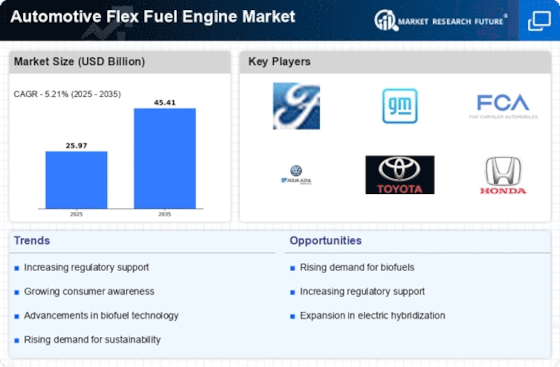Market Trends
Key Emerging Trends in the Automotive Flex Fuel Engine Market
In the ever-evolving landscape of the automotive industry, strategic positioning is crucial for companies operating in the Automotive Flex Fuel Engine market. Diverse market share positioning strategies are employed to differentiate products and attract a broad customer base in this pivotal segment of alternative fuel technologies.
A foundational strategy in the Automotive Flex Fuel Engine market is a strong emphasis on technological innovation. Companies invest significantly in research and development to enhance the efficiency, performance, and compatibility of their flex fuel engines. Staying at the forefront of technological advancements enables manufacturers to offer innovative solutions that not only meet but surpass industry standards. Advanced engine management systems, fuel injection technologies, and materials that can withstand various fuel compositions contribute to more adaptable and efficient flex fuel engines, positioning the company as a leader in the market.
Strategic collaborations and partnerships play a pivotal role in expanding market share in the Automotive Flex Fuel Engine sector. Aligning with key players in the automotive supply chain, including original equipment manufacturers (OEMs), fuel system providers, and biofuel producers, allows flex fuel engine manufacturers to integrate their products seamlessly into broader vehicle platforms. This collaborative approach not only enhances the visibility and acceptance of flex fuel solutions but also facilitates joint efforts to address industry-specific challenges, drive innovation in alternative fuel technologies, and create a more comprehensive fuel infrastructure.
Market segmentation is another critical aspect of successful market share positioning. Understanding the diverse needs of different vehicle segments, such as passenger cars, trucks, and commercial vehicles, empowers flex fuel engine manufacturers to tailor their products accordingly. Customizing engines for specific applications ensures that companies address the unique requirements of each automotive sector, appealing to a broader range of clients and gaining a competitive advantage in the market.
Educating customers about the benefits and functionalities of Automotive Flex Fuel Engines is crucial for effective market share positioning. The versatility of these engines often requires a deep understanding of their capability to run on various fuel blends, including ethanol and gasoline. Companies that actively engage in customer education and awareness campaigns can demystify their products, showcase the advantages of using renewable and alternative fuels, and build trust with clients. Informed customers are more likely to choose vehicles equipped with cutting-edge flex fuel engines, contributing to the market share of the manufacturers.
Cost competitiveness remains a critical factor in market share positioning within the Automotive Flex Fuel Engine market. Striking the right balance between offering high-quality engines and competitive pricing is essential for attracting a broad customer base. Manufacturers that optimize production processes, explore cost-effective materials, and implement efficient supply chain management practices can offer flex fuel engines at competitive prices without compromising on performance. This cost-effective strategy appeals to automakers and end consumers alike, enhancing the market share of flex fuel engine manufacturers.
Moreover, adherence to international standards and regulatory compliance is paramount in the Automotive Flex Fuel Engine market. Companies that invest in developing engines that meet or exceed emission regulations and safety standards position themselves as reliable and compliant partners. Addressing regulatory requirements not only enhances the marketability of flex fuel engine solutions but also establishes a reputation for reliability and adherence to environmental norms.
In conclusion, market share positioning in the Automotive Flex Fuel Engine market involves a comprehensive and multifaceted strategy. Companies that focus on technological innovation, strategic collaborations, market segmentation, customer education, cost competitiveness, and regulatory compliance are better positioned to thrive in this competitive industry. By aligning their offerings with the evolving needs of the automotive sector and the growing demand for alternative fuels, flex fuel engine manufacturers can secure a significant market share and contribute to a more sustainable and environmentally friendly transportation future.









Leave a Comment